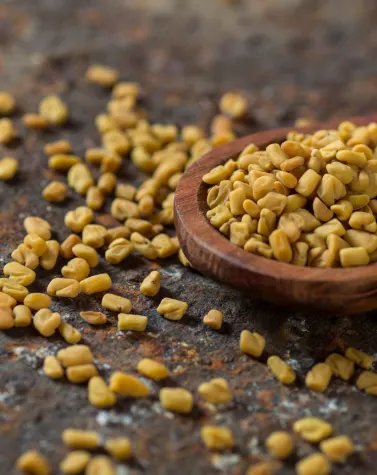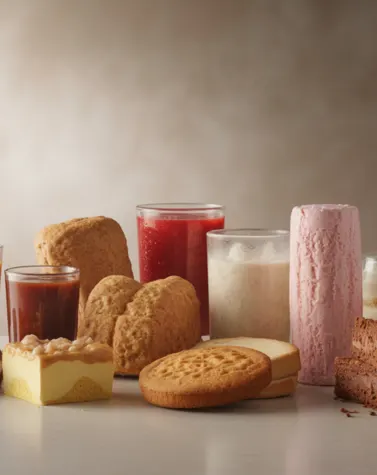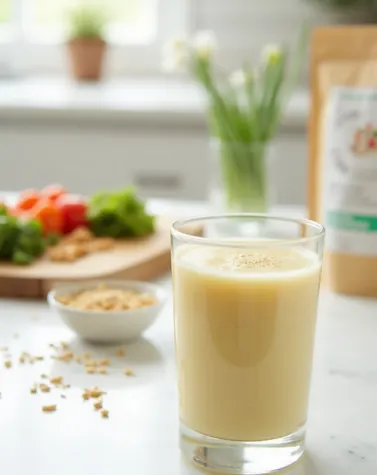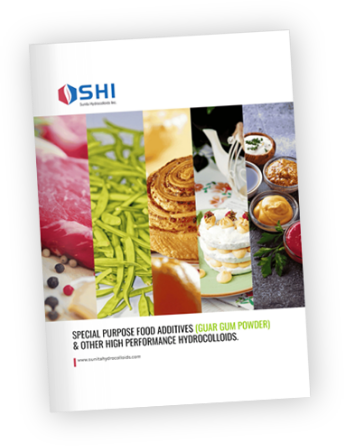
How Food Hydrocolloids Improve Shelf Life and Product Quality
Food manufacturers face mounting pressure to extend product freshness while maintaining superior quality across global supply chains. Food hydrocolloids offer a natural solution by stabilizing formulations, retaining moisture, and enhancing texture throughout a product’s lifecycle. These versatile ingredients function as thickeners, gelling agents and stabilizers that preserve both the sensory appeal and structural integrity of processed foods.
What are Food Hydrocolloids?
Food hydrocolloids are long-chain polymers, primarily polysaccharides and proteins characterized by their ability to form viscous dispersions or gels when dispersed in water. The presence of numerous hydroxyl groups increases their affinity for binding water molecules, rendering them highly hydrophilic compounds.
These substances originate from diverse natural sources including plants (guar gum, pectin), seaweed (carrageenan, alginate), microbial fermentation (xanthan gum), and animal tissues (gelatin).
Common categories of hydrocolloids used in the food industry include:
- Gums like guar gum and xanthan gum
- Pectins derived from fruits
- Starches
- Carrageenan from seaweed
- Cellulose derivatives
- Gelatin from animal sources
Each type possesses unique properties that contribute to its functionality in different applications. Sunita Hydrocolloids specializes in key hydrocolloids such as Suncol (guar gum), which are renowned for their exceptional quality and performance in the food industry.
The Science Behind Shelf Life Extension
Hydrocolloids extend the shelf life of food products through several scientific mechanisms, primarily by controlling moisture and preventing undesirable chemical reactions.
Moisture Management and Water-Holding Capacity
One of the most critical functions of hydrocolloids is their ability to manage water. Water activity, not moisture content alone, determines how water migrates between components in multicomponent food systems. Hydrocolloids bind and retain moisture within their three-dimensional network structures, preventing excessive drying and maintaining desirable texture over extended storage periods.
Baked goods containing hydrocolloids resist staling by inhibiting moisture loss and retaining softness for longer durations. Processed meats benefit from enhanced water-holding capacity that reduces purge loss and maintains juiciness throughout refrigerated storage.
Barrier Properties
Certain hydrocolloids can form thin, edible films or coatings on the surface of foods, such as fruits and vegetables. These coatings act as semipermeable barriers against oxygen, carbon dioxide, and other gases that accelerate quality deterioration. Cellulose-based coatings and alginate films create protective layers on food surfaces that slow oxidative rancidity and enzymatic browning.
These biopolymer barriers also reduce moisture migration from high-moisture components to low-moisture components in composite foods like frosted cakes or filled cookies. Hydrocolloid coatings on fresh produce extend shelf life by controlling respiration rates and preventing dehydration without compromising visual appeal.
Inhibition of Undesirable Reactions
Hydrocolloids help maintain product stability and prevent changes that degrade quality over time.
- Emulsion Stability: They prevent the separation of oil and water in products like dressings and sauces.
- Starch Retrogradation: In baked goods, they inhibit the recrystallization of starch, a process that leads to staling. This keeps bread and other baked items softer for a longer period.
- Ice Crystal Formation: In frozen foods, hydrocolloids control the formation and growth of large ice crystals, which can damage texture and cause freezer burn. This results in a smoother, creamier texture in products like ice cream.
How Food Hydrocolloids Improve Product Quality
Beyond extending shelf life, hydrocolloids are instrumental in defining and enhancing the overall quality and sensory experience of food products.
Texture Modification
Hydrocolloids function as multifunctional texture modifiers that act as thickeners, gelling agents, and stabilizers across diverse food categories. They modify rheological properties by increasing viscosity in soups, gravies, sauces and beverages, delivering the desired flow behavior and consistency. Different hydrocolloids impart distinct textural attributes like xanthan gum, which provides pseudoplastic flow and shear-thinning behavior, while guar gum delivers high viscosity at low concentrations.
Improved Mouthfeel and Sensory Attributes
Hydrocolloids enhance the overall sensory experience by providing smoother, richer, or more appealing mouthfeel characteristics that consumers associate with premium quality. They create the perception of creaminess in reduced-fat products by coating the oral cavity and simulating the lubricating effect of fat. Properly selected hydrocolloids mask grittiness, reduce sliminess, and deliver clean flavor release without leaving unpleasant after tastes. The viscosity they impart also affects temporal perception; thicker products often taste richer and more indulgent even at equivalent ingredient levels.
Stabilization and Emulsification
Hydrocolloids prevent emulsion instability in products like mayonnaise, salad dressings, and cream sauces by reducing interfacial tension and forming protective layers around oil droplets. They stabilize suspensions by increasing continuous phase viscosity, which retards the settling of particles in beverages containing fruit pulp, cocoa, or other insoluble components. The stabilizing effect extends to foams and aerated products where hydrocolloids strengthen bubble walls and prevent drainage and collapse.
The Role of Guar Gum and Psyllium: Sunita Hydrocolloids’ Contribution
Sunita Hydrocolloids provides two key products, Suncol (guar gum) and psyllium, that offer significant benefits for shelf life and product quality.
- Guar Gum (Suncol) is valued for its high viscosity at low concentrations, making it an extremely efficient thickener and stabilizer in products ranging from ice cream and baked goods to sauces and meats. Its ability to control moisture and prevent staling makes it invaluable in bakery applications.
- Psyllium is recognized for its exceptional water-binding capacity and gelling properties. As a rich source of soluble dietary fiber, it not only improves the functional properties of food but also contributes health benefits, such as promoting gut health.
As a trusted manufacturer and exporter serving the North and South American markets, Sunita Hydrocolloids ensures the highest standards of quality and reliability. Our state-of-the-art manufacturing facilities adhere to international standards, holding certifications such as ISO 9001:2015, FSSC 22000, KOSHER, and HALAL.
A Sustainable and High-Quality Food Future with Hydrocolloids
Food hydrocolloids are more than just functional ingredients; they are essential tools for building a more sustainable and high-quality food supply chain. By extending freshness, improving product quality, and reducing waste, these versatile, plant-based ingredients offer a powerful solution to some of the food industry’s greatest challenges.
Sunita Hydrocolloids Inc. stands as a trusted partner for food manufacturers dedicated to innovation and excellence. We invite you to explore the benefits of our high-quality hydrocolloid solutions and discover how they can elevate your products.





